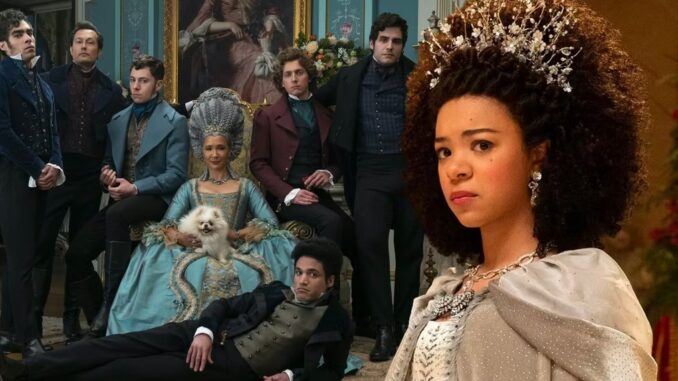
Queen Charlotte’s Children “Plot Hole” Has A Shockingly Simple Solution
Netflix’s Queen Charlotte: A Bridgerton Story raises the question about why none of Bridgerton’s season diamonds have ever married into the royal family.
Seemingly creating a Bridgerton universe plot hole, Queen Charlotte: A Bridgerton Story offers a questionable detail about the royal brood, which has a relatively simple answer. As a means to keep audiences entertained while awaiting Bridgerton season 3, Queen Charlotte expands upon Netflix’s spicy period drama by exploring Queen Charlotte (India Ria Amarteifio) and King George’s (Corey Mylchreest) early years of marriage. Apart from providing a nuanced portrait of Golda Rosheuvel’s Queen Charlotte, the Bridgerton spinoff also showcases backstories for other older members of the ton like Ruth Gemmel’s Dowager Viscountess Violet Bridgerton and Adjoa Andoh’s Lady Agatha Danbury, among others.
Notably known to play matchmaker on Bridgerton, Queen Charlotte is highly involved in the social season’s proposals, specifically with regard to her favorite debutante or the season’s diamond. Considering that the queen has a great number of children, it’s quite surprising that she hasn’t suggested a match between any of her sons to any of Bridgerton’s season diamonds (Phoebe Dynevor’s Daphne Bridgerton and Charithra Chandran’s Edwina Sharma) despite providing her nephew, Prince Friedrich (Freddie Stroma) the opportunity to court them. And while this, indeed, makes for a mind-boggling inconsistency, there is a perfectly acceptable and rational reason for Queen Charlotte ignoring her children’s love lives.
Why Queen Charlotte Never Tried To Marry Her Sons To Daphne Or Edwina

Given that Queen Charlotte and King George’s marriage bore 15 children, the royal bloodline already had its heirs, spare, and many more. So at the time of Bridgerton, seasons 1 and 2, Prince George of Wales (Queen Charlotte’s eldest son) had an heir, Princess Charlotte of Wales, who was revealed to have been with a child in Queen Charlotte’s flash forward. Technically, the line of succession during Bridgerton was secure enough with the next three generations already underway. Hence, Queen Charlotte hadn’t had a reason to consider Daphne or Edwina as matches for any of her sons prior to Queen Charlotte because it wasn’t a necessity at the time.
With Queen Charlotte’s timeline somewhere between Bridgerton season 2 and season 3, it would mean that the social season was over when Princess Charlotte died in the birthing bed. Due to the Princess Royal’s death eradicating two generations of heirs, Queen Charlotte was forced to marry off her sons — Prince Frederick and Prince Edward — to strengthen the bloodline. For obvious reasons, Daphne wasn’t a viable bride anymore since becoming the Duchess of Hastings. On the other hand, Edwina may be a plot point worth looking into since there’s hardly an explanation for her being sidelined other than the queen’s initial promise of meeting Prince Friedrich of Prussia.
Queen Charlotte Gave Her Children The Freedom She And King George Were Denied
Apart from initially not relying to secure matches for her sons and daughters, Queen Charlotte might’ve also found it was taxing rather than enjoyable to set up reluctant, hard-headed, and entitled princes and princesses. Known to be entertained by young lords and ladies stumbling upon love matches, Queen Charlotte ignoring her children’s non-participation in the social season might’ve been on purpose. Seeing as Queen Charlotte: A Bridgerton Story shows how Charlotte and George had no say on who they married, she might’ve turned a blind eye to afford her children a chance to have the choice she and George were denied.
Although Charlotte and George eventually fall in love despite their arranged marriage, this arrangement doesn’t always end happily. Queen Charlotte’s portrayal of the Danburys and Ledgers’ loveless marriages is probably something Charlotte would loathe her children to suffer. Additionally, Charlotte’s preoccupation with King George’s declining mental stability might’ve been the biggest contributor to her aloofness towards her children, who’re constant reminders of their love. May it have been out of love or disinterest, Queen Charlotte’s disregard for her children indirectly afforded them a taste of freedom despite their royalty, something Charlotte and George were denied in Queen Charlotte as a side effect of the crown.